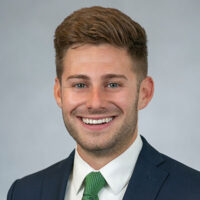Duke Daytime MBA Student Blog

My Experience as a CASE Fellow and Awarding the Kirby Prize
Being on the Kirby Selection Committee gave me a new perspective of scaling social enterprises and funding decisions.

Awarding $100,000 was never a position of power I thought I would be in. I worked in nonprofit philanthropy for six years before coming to Fuqua, and I spent most of that time cranking out cold emails to set up meetings, writing proposals on my weekends, and asking the wealthy for their checks.
As a fellow with the Center for the Advancement of Social Entrepreneurship (CASE), I had the opportunity to serve on the selection committee for the Fred Morgan Kirby Prize for Scaling Social Impact. Over three months, we narrowed from 180 applications to 20 semi-finalists, and then four finalists. CASE fellows reviewed each application, presented the merits and concerns highlighted by the proposal to our teammates, and provided recommendations to CASE staff and practitioners responsible for making the final decisions.
We reviewed applications based on a scoring guide developed by CASE, examined enterprises’ current impact and projected reach and investigated the feasibility of the scaling plan. After selecting four finalists, other CASE fellows and I helped conduct interviews with social enterprise leaders where we dug into the proposals and asked pointed questions about their scaling plans. The $100,000 prize winner was Essmart, a rural retailer B2B network based in India for agricultural products with a clear path to scale in one of the fastest-growing economies. Fellows also had the chance to meet with social enterprise leaders not selected and provide verbal feedback on how their application could have been improved. Below are my three takeaways from the formative experience.
1. Know Your Contributions
As I served on the Kirby Selection Committee, I reviewed plans from social entrepreneurs driving change in their communities, with deep expertise of the challenges faced, and I was hesitant about the value I could add. Through this experience, I realized that while I am not an expert in scaling social enterprises and unpacking complex social issues, I do have a background in areas like nonprofit fundraising and organizational change management. The unique skillset I gained gave me a different perspective of the goals of social impact leaders and their considerations for growing an organization and increasing social impact. My experience was the key to feeling confident in my abilities while interviewing and eventually meeting with leaders face-to-face.
2. Rely on Your Community
When reviewing the applications and comparing scaling plans, I realized there were a lot of gaps in my knowledge. Relying on other CASE fellows was one of the biggest takeaways from the selection process. Fuqua, and the CASE Fellow cohort in particular, places a tremendous emphasis on bringing together a diverse set of viewpoints and backgrounds—our CASE cohort includes everyone from former global health workers to investment bankers. CASE fellows advising each other and bringing their diverse perspectives throughout the process was crucial to our success.

3. Understand What Fuqua Has to Offer
Many people know Fuqua is a top business school that produces compassionate and smart leaders that go to all sectors, but the experience of being on the Kirby Selection Prize Committee showed me the things I did not realize Fuqua offers, including that Fuqua is a grant-maker. As a former fundraiser, CASE was one of the main reasons I chose to attend Fuqua. Being on the committee showed me the other side of fundraising by giving me an immersive view what it’s like to be a funder. I learned the inner workings of funding decisions and observed the elements of a funding proposal that make one enterprise stand out from another. My understanding of how to communicate the need for funding, and the importance of aligning your enterprise’s work to the funder’s goals, was dramatically improved through being on this committee. The experience inspired me to explore more areas of the business school I previously might have overlooked—such as taking my first course at the Duke’s Sanford Policy School and becoming more involved in other Fuqua clubs’ symposiums and speaker events.



